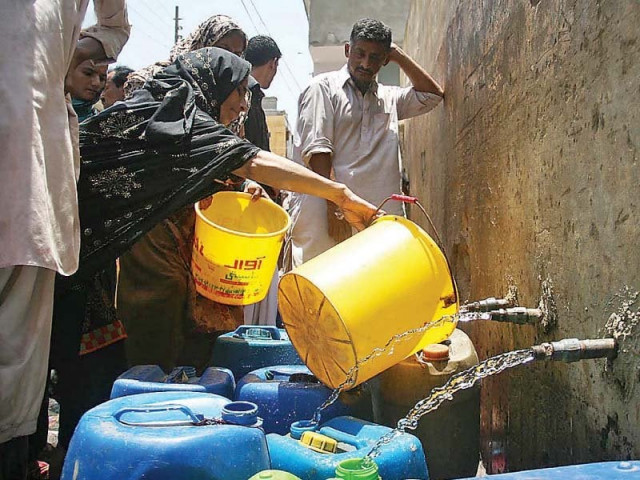Water woes: Judicial commission seeks reports from federal, provincial govts
Reports should detail efforts made by respective govts regarding amelioration of water situation

People filling water bottles from a pumping station in Baldia Town due to the acute water shortage in the city. PHOTO: FILE
The commission, headed by Justice Muhammad Iqbal Kalhoro of the Sindh High Court, also directed the additional attorney-general and advocate-general to propose the name of an expert on the subjects for appointment as amicus curiae for assistance of the commission.
The additional attorney-general, Salman Talibuddin, and advocate-general Zamir Ghumro requested for three weeks' time to enable them to seek reports from the authorities concerned. However, Justice Kalhoro allowed them one-week time, observing that the commission has to wrap up its investigations within six weeks.
The commission provided a questionnaire, containing 26 queries to the law officers to prepare the reports on.
Clean drinking water
It has asked both the governments about the modes, means and sources to provide/supply clean drinking water to the people of Sindh. It has asked if River Indus is not a source of drinking water to the province, if its water has become poisonous and unfit for human consumption and if any lab tests have been carried out before supplying the same to the people.
The commission further asked the governments if any testing of the water from sources other than River Indus is conducted before its supply to ensure its drinkability. The reports will also inform if the sub-soil/underground water is clean and fit for human consumption along with results of water samples tests conducted by renowned laboratories.
The authorities will also answer what is the statutory and supervisory role of the Sindh government over bodies like the Water and Sanitation Authority (WASA) and North Sindh Urban Services Corporation (NSUSC), which are primarily responsible, among others, for providing clean drinking water and maintaining better sanitation conditions in their respective areas of operation.
The commission asked how much amount is being spent by the provincial government annually on the supply of drinking water and improvement of sanitation conditions.
Sewage disposal
The inquiry body also wants to know as to how and where the sewage/effluent/waste is being disposed of in the major cities of province and about the functioning of the waste management programme in each district and its implementation.
It has also asked if such disposal is being dumped into irrigation channels, which are also a source of drinking water, adding if such disposal/effluent is being treated.
The authorities will have to inform the court about the planning, projects or schemes started to treat disposal at the dumping stations and, if not, its adverse effect on human lives as well as environmental sustainability.
Environmental protection
The commission questioned what role the provincial environmental protection agency had played as provided in the Sindh Environmental Protection Act, 2014, adding whether the agency had conducted any study to determine the adverse impact of non-provision of clean drinking water to the people and consequences of the poor sanitation conditions on the ecology.
The agency's head will explain the causes if such exercise was not carried out.
The inquiry commission has also questioned the statutory responsibility of the provincial government in whole scheme and what policies, initiatives, schemes and projects were undertaken by the relevant departments to supervise and ensure unhindered provision of drinking water and prevalence of better sanitation conditions in province.
The chief secretary has been asked if the relevant departments had not performed their duties and if no tangible results were achieved in this regard, who could be held responsible and what consequences are provided in the law that shall follow such failure.
The commission also wants to know if there is any mechanism of accountability in the Sindh government to press against officials found delinquent in performance of their duties to make sure facilities of clean drinking water and improved sanitation.
A two-judge bench of the Supreme Court, headed by Justice Amir Hani Muslim, had ordered constitution of a judicial commission to probe into the allegations regarding non-supply of clean drinking water, poor sanitation conditions and deteriorating environment in the province.
Published in The Express Tribune, January 3rd, 2017.

















COMMENTS
Comments are moderated and generally will be posted if they are on-topic and not abusive.
For more information, please see our Comments FAQ